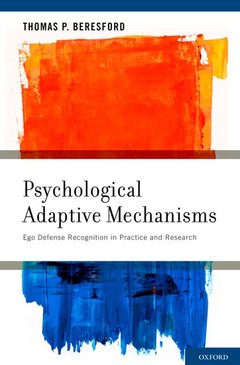Description
Psychological Adaptive Mechanisms
Ego Defense Recognition in Practice and Research
Author: Beresford Thomas P.
Language: English
Subject for Psychological Adaptive Mechanisms:
Publication date: 06-2012
338 p. · 19.4x23.5 cm · Hardback
338 p. · 19.4x23.5 cm · Hardback
Description
/li>Contents
/li>Biography
/li>
This book will demonstrate how to use novel, systematic method for recognizing psychological adaptive mechanisms (known in psychoanalytic theory as ego defenses) in clinical encounters. This clinical method is based in published theoretical and empirical studies of these mechanisms over the past 14 years as well as working with successive classes of mental health trainees of varying disciplines at the University of Colorado. The result is an approach that trainees both apprehend and find useful. This work will offer the mental health disciplines, and even wider audiences, a platform both for 1) clinical use in everyday practice, 2) continuing clinical studies of adaptive psychology as well as 3) direct application of psychological adaptive mechanisms theory in clinical research that will improve the diagnosis and treatment of persons with mental or emotional disorders. This an important empirical model for understanding how humans adapt to the stressful experiences of their lives. They have developmental, biological, and evolutionary significance and all of these will be discussed in the book. Psychological Adaptive Mechanisms are observable behaviors that range on a developmental hierarchy from the Primitive defenses of normal early childhood and of major mental illness in adults, through the Mature defenses of fully functioning adulthood. They also serve to limit and to direct the human anxiety response, giving the "fight or flight" reaction to threat many more than those two classically described behavioral options.These mechanisms are likely transduced by the brain and, in providing wider ranges of adaptive behavior, most probably reflect an evolutionary selection towards greater flexibility of adaptation.
Chapter 1: Humans Adapt. Chapter 2: The Clinical Model. Chapter 3: The Clinical Method. Chapter 4: Denial. Chapter 5: Avoidance/ Distortion. Chapter 6: Psychotic Projection. Chapter 7: Acting Out. Chapter 8: Passive Aggression. Chapter 9: Hypochondriasis. Chapter 10: Schizoid Fantasy. Chapter 11: Neurotic Projection. Chapter 12: Repression. Chapter 13: Intellectualization, or Isolation of Affect. Chapter 14: Dissociation. Chapter 15: Displacement. Chapter 16: Reaction Formation. Chapter 17: Suppression. Chapter 18: Anticipation. Chapter 19: Altruism. Chapter 20: Sublimation. Chapter 21: Humor. Chapter 22: Clinical and Practical Uses. Index.
Dr. Beresford is Professor of Psychiatry at the University of Colorado School of Medicine. Trained in psychiatry at The Cambridge Hospital/Harvard Medical School, he has focused his clinical and scientific career on the psychiatric problems that medical and surgical patients encounter, whether in adjusting to illness or in returning to normal brain functioning. His interest in psychological adaptive mechanisms comes from applying scientific methods to clinically relevant human behavior and brain function. He has developed both clinical and teaching methods to understand and use adaptive mechanism recognition with greater, and more practical, precision. Dr. Beresford is internationally known for his work in alcoholism and liver transplantation where he developed a clinical method for evaluating alcohol dependent patients for this life saving procedure.
© 2024 LAVOISIER S.A.S.

